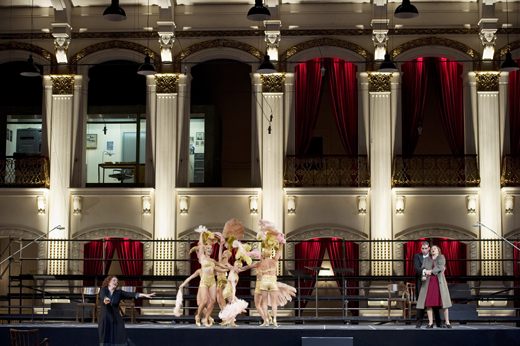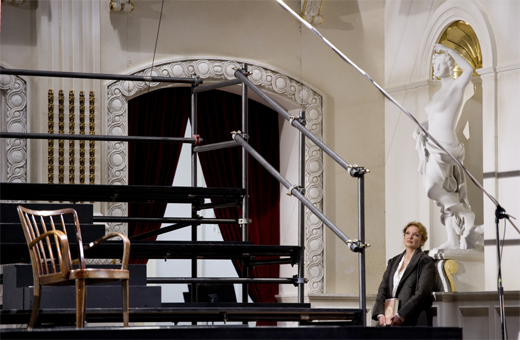 Austria R.Strauss, Die Frau ohne Schatten: Soloists, Christian Thielemann (conductor), Vienna Philharmonic, Concert Association of the Vienna State Opera Chorus, Grosses Festspielhaus, Salzburg, 17.8.2011 (JFL)
Austria R.Strauss, Die Frau ohne Schatten: Soloists, Christian Thielemann (conductor), Vienna Philharmonic, Concert Association of the Vienna State Opera Chorus, Grosses Festspielhaus, Salzburg, 17.8.2011 (JFL)
Production Salzburg Festival
Direction: Christof Loy
Sets: Johannes Leiacker
Costumes: Ursula Renzenbrink
Light: Stefan Bolliger
Chorus: Thomas Lang
Cast
Empress: Anne Schwanewilms
Emperor: Stephen Gould
Dyer’s Wife: Evelyn Herlitzius
Barak the Dyer: Wolfgang Koch
Nurse: Michaela Schuster
et al.

Phantasmorgastic, but with Shadows
Richard Strauss’ intended masterpiece, Die Frau ohne Schatten, is hard to hail without acknowledging that it has weaknesses, too. Best and most tersely put by Paul Brekker after the 1919 premiere: “The opera suffers from that most dangerous of ailments: it’s boring. It drains the audience’s willpower to object, lulls him with euphony and melodies, dulls her with images and theatrical phantasmagoria. A mix made lethal by stretching it over three acts and eleven scenes.” But it’s also Christian Thielemann’s favorite Strauss work because, as he explains, “it has it all; the finely articulated structure and full-blooded build-ups, poetry and hysteria, and glorious harmonies. Elektra meets Ariadne.”
Die Frau ohne Schatten, tenderly nicknamed “Frosch” (Frog) by Strauss, is not performed very often because of the demands it makes on casting, scenery, and orchestra: It basically needs two top-notch dramatic sopranos of Wagnerian proportions, one Heldentenor, a dramatic mezzo and one Wotan-esque bass-baritone. And all—please—with a lyrical bent. It asks for over 150 instruments and almost as many musicians, and the stage direction would seem to demand on the spot floods and several instances of magic. It would be perfect for a film version of the opera, but sufficient turn whole shocks of hair gray on directors trying to figure out how to stage the odd tale. One woman—the shadow-less empress—cannot bear children but wants to, in order to become truly human. Another would gladly give up her right (or ability) to bear children in exchange for the alleged liberty that comes with that. Their dramatically rather less relevant men are active bystanders. A Nurse, the Empress’ guardian—and creature of both worlds, the human world of the dyer Barak and his wife and the nether-realm of Emperor and Empress—is the catalyst and nefarious schemer. Strauss wanted to create an opera that was to the Magic Flute what he thought his Rosenkavalier was to Le Nozze di Figaro. The result is more of a Parsifal-themed Magic Flute… except that the works of Strauss (especially true when working with Hugo von Hofmannsthal) have an inextricably human, even bourgeois, element at their center, no matter how superficial magic is involved.The Salzburg production of Die Frau ohne Schatten must be hailed, in any case, because musically (if not vocally) it was a stunning success thanks to Thielemann’s conducting; succulent and lean in turns, modern yet intransigently sumptuous. The staging by Christof Loy, in four words, was too clever by half… but at least it was clever and pretty to look at, too.
Reactionary—old fashioned, counter to our zeitgeist—might be the form of Die Frau ohne Schatten. But the expression itself, of the desire for love, marriage, and family as the nucleus of life, expressed not the least in childbearing, is not reactionary. It does not fit easily into a time dominated by narcissism and ‘self-actualization’—a time where children are deemed a burden or sacrifice, a manifestation of one’s own ego, or a territorial claim on a woman, an abdication of the fully lived life, rather than its noblest goal and fulfillment. But the desire itself is and will always remain a beautiful thing. Is that so hard to accept when staging this opera? The language of the catholic Hofmannsthal strikes 21st century ears as patronizing, no doubt, but it is merely old-fashioned yet well intentioned (like Barak himself)?
Christof Loy strips away the immediateness of the subject and introduces distance by going the route of opera-performance-within-opera-performance. He sets the story like someone who does not believe in the emotion that lies at the heart of Hofmannsthal’s nostalgia-laced text, except on a superficial level. He describes and circumnavigates the core without feeling or touching it. The narrative is tied to the first complete* recording of Die Frau ohne Schatten with Karl Böhm in the winter of 1955 for Decca. Set (anachronistically) in Vienna’s Sophiensaal, the space for many other very famous Decca opera productions in Vienna, it focuses on the stories of the performing singers (among them the ‘innocent’ newcomer Leonie Rysanek as the Empress and Elisabeth Höngen—a German star in the war-years (!) and a favorite of Karl Böhm as the manipulative nurse), and the analogies between their collegial relationships and the relationships of the characters in the libretto. Eventually (late in the first, early in the second Act) there occurs an overlap of interpreters and roles. The jealousies, desires, and fears of interpreter and role blend into an intractable whole. The singer of the role of Empress enters a new, strange world populated with already-famous, experienced colleagues. Stephen Gould alias Hans Hopf alias The Emperor is a nervous tenor who seeks isolation and records his difficult aria in a secluded session at night. The Dyer and Wife are married but estranged (Christel Goltz and Paul Schöffler of the unpaid, unheated 1955 recording sessions were definitely neither) and—as in the opera, so in this opera about the recording of the same opera—find together again during the ‘recording’ of Act III. In a long dream scene all the extras are replaced with identically dressed and groomed seven-year-old alter egos.
(Confusing might be that some elements of this, Loy’s, production would easily fit the story of Karl Böhm’s other, later performances and recordings in the late 70s: Birgit Nilsson as the blond ‘foreign’ Empress… except no longer new or an outsider, and two protagonists—Walter Berry and Christa Ludwig—as a famous married singer-couple… except then already divorced and she singing the part of the Nurse, not the Dyer’s wife.)
A sense of general unease is conveyed terribly-terrifically, the many supernumeraries that populate the set help create the unspoken tensions, and the gorgeously detailed set (Johannes Leiacker with Ursula Renzenbrink in charge of the costumes) is time-travel-inducing… down to the self-important 1950s secretary and groundskeeper. The specter of the Third Reich is clearly still hanging over the scene… and could he not, only a decade after 1945, with people like Böhm involved and taking place in the seedily anti-Semitic Vienna?! Anne Schwanewilms in her role as young-Rysanek/Empress moves about the set as if disconnected from the rest, observing and occasionally reacting. In line with the opera, she doesn’t really get going until act III, but then with minimal means to great effect. Her high notes were excellent, clean, penetrating, even as some of the murderous leaps fell short. But that’s peanuts in a live performance of this length and of such demands. Notable, though, that in one very small frequency band, stretching at the most a semi-tone in her lower mid-range, her vocal chords made worrisome noises, like a speaker’s busted and frayed tweeter fluttering and jittering.
Benefiting most from the fact that the performance was—on Thielemann’s insistence—uncut, is the Nurse whose role becomes the dramatic equivalent (and more) of the other four principals. Michaela Schuster, more stage-animal than a beautiful voice, jumped into the role head first and came out victorious—cajoling and oogling at her colleagues with an expressive face vaguely reminiscent of Stephen Fry’s. Dramatically it was a peak performance and any stridence appropriate given that her parts include the most modern music, reminiscent of Elektra or Salome or even Ortrud in Lohengrin.
The Emperor might be the least important of those five (even in the cut version), but he makes up lack of singing time and action with the difficulty of his parts. Stephen Gould performed admirably more than convincingly. Treating his male singers generally less kindly than his sopranos and mezzos, Strauss doesn’t cut the same swaths of instruments out of the score as he does for his heroines. While Strauss often thick orchestration parts like the Red Sea before the ladies, the men have to struggle right through it. Including Wolfgang Koch, who had more to do than Gould and did more with it. His bearish Barak plead believably for his idea of forgiveness, love, and family as something that spelled not servitude (as his wife first sees it; ditto Christof Loy) but a merging of two into one as an equitable partnership. The sacrifice of egoism yes, but not individuality. It’s mutual, tender, loving, even if the language to express it is archaic. His acting could have been better, though: the emotions expressed by his Barak/Schöffler were not quite believable. In particular the rage and the relief felt staged, not lived. ‘Seething’ looks distinctly different than his hectic gesticulation, as do helplessly boiling over with anger and blood-rage. A lesson with Christian Gerhaher might prove the necessary treatment.
Evelyn Herlitzius, the Dyer’s wife, combined vocal prowess with dramatic skill in the best performance of the night. She gave much needed life to the frosty production, especially in the second act when musically and dramatically things really started to together. The ears woke up, or perhaps the music, or the performers (the Vienna Philharmonic had, on this, the penultimate of seven performances, smeared a few too many delicate bits in the first act), or all three… in any case one got a more palpable sense of the acoustic awesomeness of the work and a tear or two may have moistened my cheek. Thielemann coaxed and received from an orchestra that eats out of the palm of his hand, neither afraid of underscoring the score’s modernity nor hesitant when it came to luxuriating and reveling in the sound. One felt at all times the audience’s sensitive for the achievements that are CT’s in the success of this work.
Die Frau ends, like most Strauss operas, on a note of distinct ambiguity. Although superficially everything is hunky-dory, with the couples extolling humanity and praising their babies-to-be, mild uncertainty creeps in through the cracks. The scene—“a beautiful landscape” says the libretto—was set apart from the recording session theme… now set a few weeks later at a Christmas gala concert with a boys choir (those future children!) present and the Empress living through it as if it were still all-too surreal that she has made it into the upper echelon of continental opera stars—exiting to terribly contrived slow-motion applause. Clever, again. Just a little too clever.
Jens F. Laurson

